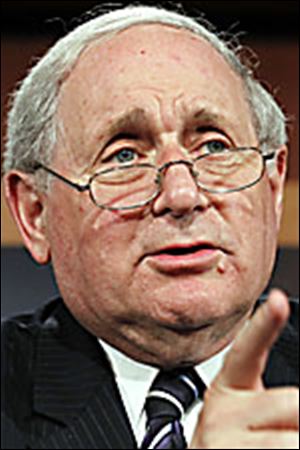
EDITORIAL
Base of abuse
6/14/2013
Levin
The U.S. military’s problem with sexual assaults has come under heavy scrutiny in recent years. But a recent Defense Department report suggests that the epidemic has only gotten worse.
An estimated 26,000 troops said they experienced “unwanted sexual contact” in 2012, an increase of 37 percent from the previous year. Yet fewer than 1 percent of last year’s military sexual assault cases resulted in conviction.
The new report, and a number of recent, high-profile cases of sexual misconduct, have incited calls to reform the military’s justice system from the outside. The most promising proposal was a bipartisan bill introduced by Sen. Kirsten Gillibrand (D., N.Y.), which would have transferred authority over complaints of sexual misconduct and other serious crimes from commanders to prosecutors outside the chain of command.
Sadly, and uncharacteristically, Sen. Carl Levin (D., Mich), who chairs the Senate Armed Services Committee, killed Senator Gillibrand’s proposal this week. She needs to try again.
Military commanders have the power to decide whether serious crimes are brought to trial. This discretion should be given instead to qualified, independent military lawyers who do not have an interest in a case’s outcome.
Commanders’ power to overturn guilty verdicts for serious crimes also should be abated. Such reforms would better ensure the impartiality and accuracy of trials, encourage victims of sexual violence to report crimes, and ensure a higher conviction rate.
Unsurprisingly, military leaders roundly oppose removing oversight of crimes from the jurisdiction of commanders. Army Chief of Staff General Ray Odierno said such reform would not work and would “hamper the delivery of justice,” citing “the central role of the commander” in maintaining order.
Senator Levin agreed. He said the Gillibrand bill would “likely weaken” responses to sexual assault, although he conceded the need for other changes.
But if the Defense Department’s figures are any indication, the military justice system has already proved a resounding failure at preventing and trying incidents of sexual assault. The burden should fall on those who oppose Ms. Gillibrand’s bill to justify the need for charges of such crimes to be assessed by commanders without a legal background and with significant conflicts of interest.
The military is cited as an outlier from the rest of society in the frequency and severity of its sexual assault cases. An estimated 45 percent of sexual assaults in the United States are reported, compared to a dismal 13 percent of military assaults reported last year.
But there are similarities on sexual assaults in the military and civilian spheres. The nation’s 3 percent conviction rate for sexual assault is scarcely better than the roughly 1 percent of military assaults that resulted in conviction in 2011-12.
Reforms such as those in the Gillibrand bill would give the military the opportunity to become an institution that defies rather than mirrors the nation’s sexual assault problem. The military — where order, discipline, and cohesion are requisite — is better positioned than civilian society to oust the scourge of sexual violence from its ranks. Senator Gilliland’s legislation merits approval.